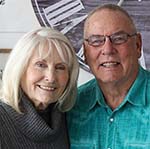introducing our missionaries...
It all began in our small church in Montana that really taught missions,” say Tom & Donna Cnossen. “Our pastor would take couples up to Prairie Bible Institute’s missions conferences, and it was there that we heard about NCEM.”
With their three young children, the Cnossens spent the summer of 1986, and the following summer, in the remote northern Manitoba village of Red Sucker Lake. “Our family loved those experiences,” they remember. After graduating from Millar College of the Bible in 1988, there was still some missionary training, raising their support, and immigrating to Canada. By the spring of 1989 they were on their way to Kuujjuarapik, Quebec.
No permanent housing could be found there, and that fall they were reassigned to Cormorant Lake, Manitoba, to serve in church planting and discipling. While at Cormorant, Tom initiated Higher Challenge, a wilderness camping outreach to teens that continues. In 1995 the Cnossens moved to Timber Bay, Saskatchewan, where for 12 years they did church planting that included Montreal Lake Cree Nation, along with camp outreach. Then in 2007 they moved to their present location, serving on the four Maskwacis First Nations in central Alberta.
With leadership and church development, the Cnossens stay busy with Maskwacis Bible Fellowship Church. Besides Sunday services, there are Bible studies, men’s, women’s, and youth groups that meet regularly. For a number of years they have also been involved with the nearby Louis Bull All Nations Church. They enjoy partnering with Mario Swampy, the Cree pastor there, who they have known since moving to Alberta. Tom continues with Higher Challenge, which has expanded to include winter camps.
“Each experience over the years has helped us build into what we are doing today,” say Tom & Donna. “We have worked with many different people from NCEM and other missions, and have learned a lot from them. Our greatest source for learning, besides the Lord and His Word, has been the Cree people themselves.
“We often tell people who want to help to just be quiet and listen to the people. They have a lot to say, but we need to be listening. Listening leads into relationship, and relationship into trust, which builds a platform for sharing the Gospel, which in turn leads to spiritual growth.”
The Cnossens have found that their various ministries do overlap, and strengthen each other. They see wilderness camping, for instance, as an ideal place for discipling. “Campers are open to deeper relationships as we experience the unknowns of the wilderness: storms, adversity, hard work, teamwork, beauty, relational challenges – things like that. In a natural setting campers see evidence of the Creator all around, and are more open to the Gospel.”
Friendships with campers continue years later. “Most campers come back year after year,” they say, “and, significantly, because we are in church planting, we find these youth coming to church services, Bible studies, and youth groups. We see some of them year round, and walk with them. They become the nucleus of the church. We believe combining camp and church planting is a very positive thing.”
Tom has found the same in men’s ministries. “Many men might avoid ‘church,’ but few avoid an invitation to go camping, paddling, hunting or fishing (didn’t Jesus fish with men?). Through men’s breakfasts and campouts, we’ve seen them start coming to church and Bible studies. They take on leadership in services, reading the Word, praying, and more. With women, Donna also sees good things. It is evident as ladies share their lives while working together to prepare food for Fellowship gatherings.
The Cnossens also use social media to complement church planting. “Native people make friends for life,” they’ve observed, “so things like Facebook are good tools to keep those relationships going.” During COVID they had their Fellowship services online, and found that even folks from their previous ministry locations were tuning in. Facebook also enables the Cnossens’ supporters to “meet” their First Nations friends and pray for them. “So we are always combining and overlapping ministries, and are open to the Holy Spirit’s ideas as how to reach people – He has the best ideas!”
The Lord uses His people working together, and the Cnossens have especially seen that at Maskwacis. They aren’t all full-time Christian workers – at least they don’t start out that way – but they are people who God has called to serve. Over the years their team has included: a retired pastor and his wife from Georgia, a policeman and his family from Calgary, a mechanic’s family from a local Dutch community, a local farm family, Korean believers from Edmonton, a Nigerian engineer, and a Cree Band councilor … all working together to establish the church at Maskwacis.
“Only God can do something like that,” say Tom & Donna. “We count it a privilege to serve in such an interesting and fulfilling calling. We thank God for this and have seen Him change many lives for His glory!”



